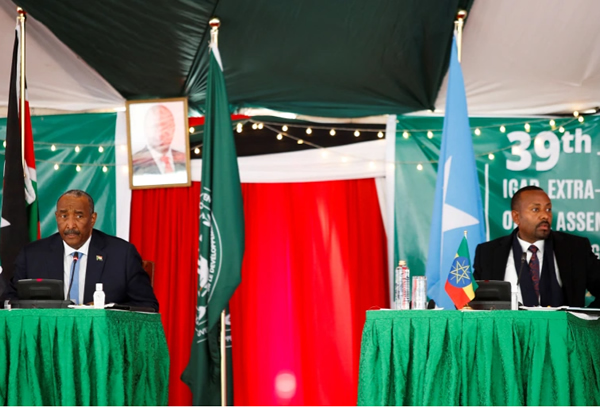
Ethiopia’s Prime Minister Abiy Ahmed said he has reached an agreement with the leader of neighbouring Sudan to peacefully settle a border dispute that has led to armed clashes.
The talks between the two leaders follow fighting in a volatile border region last month in which Sudan said that Ethiopian forces had captured and killed Sudanese troops – a claim denied by Addis Ababa.
The Ethiopian premier met Sudan’s military leader, General Abdel Fattah al-Burhan, in Kenya’s capital Nairobi on Tuesday, on the sidelines of a meeting of the Intergovernmental Authority on Development (IGAD), an eight-member regional bloc.
“We have both agreed that our two countries have plenty of collaborative elements to work on peacefully,” Abiy tweeted on Tuesday.
“We both made a commitment for dialogue & peaceful resolution to outstanding issues,” he said.
Burhan said the IGAD meeting gave them an opportunity “to take stock of the response” to challenges in the region, but he did not elaborate.
“We are happy to convene in a very short time to discuss matters of great importance,” he said.
Sudan’s ruling sovereign council said only that there had been a “closed-door meeting” between al-Burhan and Abiy.
A long-running dispute over a contested fertile border region, al-Fashaqa, has fuelled a surge in tensions between the two countries in recent years, including clashes.
Tension over al-Fashaqa, which lies within Sudan’s international boundaries but has been settled by Ethiopian farmers for decades, has escalated in recent years alongside a diplomatic spat over Ethiopia’s construction of a hydropower dam.
Trading accusations
In the latest trading of accusations between both nations, last month Sudan accused Ethiopia’s army of executing seven Sudanese soldiers and a civilian who had been taken captive.
The men had been seized on Sudanese territory on June 22 and taken into Ethiopia where they were killed, according to the Sudanese foreign ministry. Ethiopia denied responsibility and blamed the killings on a local militia.
A day after the countries traded accusations over the killings, an Ethiopian official said Sudan’s armed forces had fired heavy artillery during clashes in the disputed area.
The more recent rift also feeds into wider tensions over land and water between the neighbours, particularly stoked by Ethiopia’s mega-dam on the Blue Nile.
Sudan and Egypt, both downstream countries, have been opposed to the Grand Ethiopian Renaissance Dam and pushed for an agreement on the filling of its reservoir and the dam’s operations. Tensions were heightened after fighting erupted in Tigray in November 2020, sending tens of thousands of refugees fleeing into Sudan.
Al-Burhan was in Kenya a day after announcing that Sudan’s army, which seized power in a coup in October last year, would make way for civilian rule.
Sudan’s main civilian bloc, the Forces for Freedom and Change, on Tuesday rejected al-Burhan’s proposal, with protesters again defying security forces and holding firm with makeshift barricades on the streets of Khartoum.
IGAD, along with the United Nations and the African Union, has been pressing for talks between the army and civilian protesters in Sudan.
Source: News Agencies























